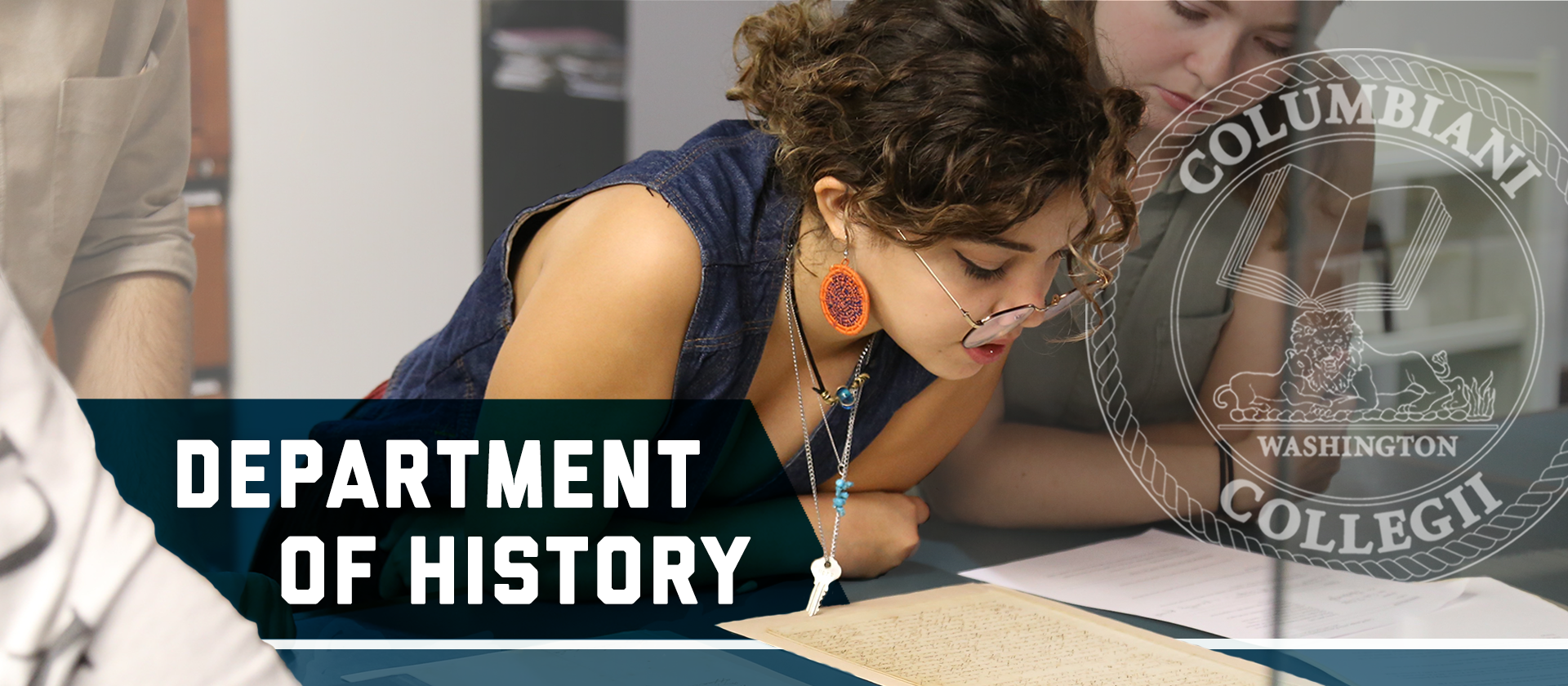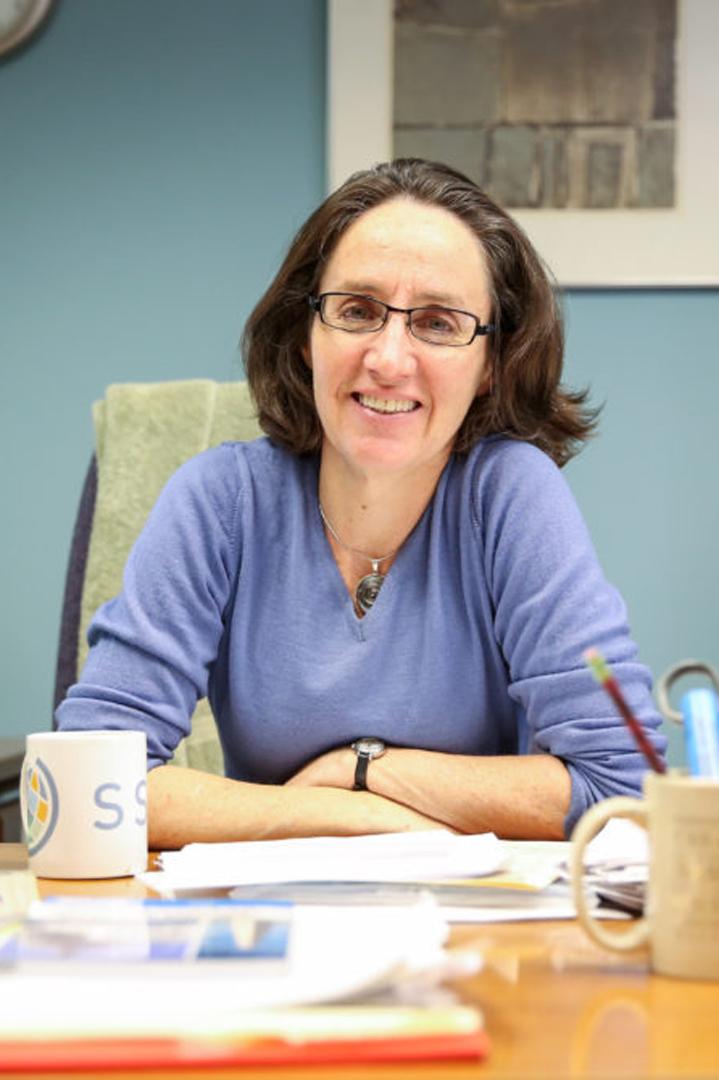2024 History Newsletter

Message from the Chair
Department Spotlights
In Memoriam
Department Kudos
Alumni Class Notes
Message from the Chair
Greetings to all of our alumni from the George Washington University Department of History! In this newsletter, you’ll read about a few of the exciting things happening in the department, including the achievements of our community of alumni, faculty and students.
The History Department continues to thrive thanks to our fabulous faculty, students and alumni. This year, Quito Swan (featured in this newsletter) joined the department as a professor of history and director of the GW Africana Studies Program. We also welcomed our largest graduate class in recent memory, and our undergraduate major continues to defy national trends by growing. GW’s chapter of the Phi Alpha Theta National History Honor Society also hit an all-time high.
Thank you so much for your support and involvement, which makes our continued success possible. Please stay in touch.
Sincerely,
Denver Brunsman
Department Chair
Department Spotlights
Quito J. Swan Brings Global Links to Africana Studies
As the new director of the Africana Studies Program at the Columbian College of Arts and Sciences, Professor of History Quito J. Swan strives to make connections—across disciplines, movements and oceans. He was profiled in GW Today.
Artificial Intelligence Is Here to Stay, so We Should Think More About It
A daylong symposium titled “I Am Not a Robot: The Entangled Futures of AI and the Humanities” brought GW faculty and experts in the field together to discuss the use of generative artificial intelligence. It was organized by Associate Professor of History Katrin Schultheiss and covered by GW Today.
In Memoriam
This past year, the History Department mourned the passing of three emeritus faculty members who made significant and lasting contributions to the department.
- Professor William H. Becker was an eminent scholar of the history of American business, economy policy and international financial institutions. He served with distinction twice as history department chair and shaped the faculty, curriculum and life of the department.
- Professor Diane Harris Cline held a joint appointment in History and Classical Near Eastern Languages and Civilizations. A gifted scholar and teacher, she was a pioneer in the digital humanities and use of social network analysis to better understand the ancient world.
- Professor Linda Levy Peck was a pathbreaking scholar of early modern Britain and an award-winning author of works on British politics, political thought and culture. She broke barriers for women in the historical profession and helped younger scholars, women and men, throughout her career.
Department Kudos
- Abigail Agresta’s book The Keys to Bread and Wine: Faith, Nature and Infrastructure in Late Medieval Valencia was awarded the Turku Book Award for best book in environmental history by the European Society for Environmental History and was a finalist for the American Society for Environmental History's George Perkins Marsh Prize for best book in environmental history.
- Paula Alonso was awarded a two-year research grant from the Gerda Henkel Foundation. As co-PI with Eduardo Posada-Carbó (Oxford University), she will lead a team of scholars on the project “Latin America and the Global History of Democracy, 1810-1930.”
- Joel Blecher co-edited and translated Ibn Hajar al-Asqalani's Merits of the Plague. It is the first English translation of the preeminent meditation on plagues and pandemics from the Islamic medieval world. He also co-edited Hadith Commentary: Continuity and Change. The American University in Cairo also named Blecher as this year’s Bayard Dodge Visiting Professor in its Department of Arab and Islamic Civilizations, an honor previously bestowed on the late renowned scholar Edward Said and other leading figures in the field of Middle Eastern Studies.
- Denver Brunsman received an NEH grant to direct the K-12 summer institute “The Making of America: Colonial Era to Reconstruction” at GW last summer. He also received an Exhibitions Planning Grant from the NEH for his project “The Long Struggle for Equality: The Declaration of Independence at 250.” He will work with the Gilder Lehrman Institute of American History and the American Library Association to create a traveling exhibition and related public programming for underserved rural and urban libraries on the history of the Declaration of Independence from its origins to the present.
- William E. Burns authored They Believed That? A Cultural Encyclopedia of Superstitions and the Supernatural around the World. The book covers a range of superstitious, supernatural and otherwise unusual beliefs from the ancient world to the early 19th century. Burns also edited Astrology and Western Society from the First World War to Covid-19.
- Robert J. Cottrol co-authored To Trust the People with Arms: The Supreme Court and the Second Amendment. The book integrates history, politics and law to trace the roles that guns and the Second Amendment have played in American life.
- Gema Kloppe-Santamaría’s book In the Vortex of Violence: Lynching, Extralegal Justice, and the State in Post-Revolutionary Mexico was translated into Spanish, and her research has been featured in numerous American and Mexican media outlets. She also presented to the Mexican Senate on the topic of femicides.
- Tom Long retired after a distinguished second career as a professor and longtime undergraduate advisor following his first career as a lawyer. Long’s retirement celebration was attended by more than 50 of his former students, including a third of the alums of his signature course, The Price of Freedom: Normandy, 1944.
- Gordon K. Mantler published The Multiracial Promise: Harold Washington’s Chicago and the Democratic Struggle in Reagan’s America. Drawing on a rich array of archives and oral history interviews, the book offers a bold reexamination of the Harold Washington movement and moment in Chicago.
- Warren Milteer, Jr.’s book Beyond Slavery’s Shadow: Free People of Color in the South received both the Charles S. Sydnor Award for the best book in southern history published in the previous year and the Sam Ragan Old North State Award from the North Carolina Literary and Historical Association for the best work annually of North Carolina nonfiction.
- Eric Schluessel co-edited Community Still Matters: Uyghur Culture and Society in Central Asian Context. The essay collection presents a multidisciplinary overview of Uyghur studies today, highlighting contributions from Uyghur diaspora and exile scholars. Schluessel also translated The Tarikh-i Ḥamidi: A Late-Qing Uyghur History, an epic and tragic history from the region of Xinjiang in northwest China, the homeland of the Muslim-majority Uyghur people.
- Michael W. Weeks retired after more than 30 years as the operations manager for the History Department. The department held a large celebration and named its lounge in his honor.
Alumni Class Notes
- Adam Kutnick, MS ’13, develops blood tests using LC-MS technology at the Cleveland Clinic in Cleveland, Ohio.




